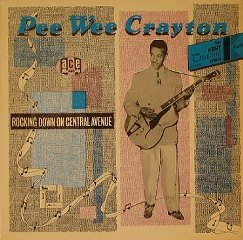Pee Wee Crayton – Rockin’ Down on Central Avenue (2010)
Pee Wee Crayton – Rockin’ Down on Central Avenue (2010)

1. Austin Boogie
2. Tired of Travelin'
3. Crayton's Blues play
4. Change Your Way of Loving
5. Answer to the Blues After Hours
6. T for Texas (Mistreated Blues)
7. Rockin' the Blues
8. Huckle Boogie
9. Central Avenue Blues
10. Long After Hours
11. Louela Brown
12. When a Man Has the Blues
13. Please Come Back
14. Pee Wee's Wild play
One of the finest guitarists of the early postwar West Coast blues scene, Connie Curtis "Pee Wee" Crayton today is a largely forgotten figure - a most unfortunate situation given the man's talent and legacy as a one-time hitmaker. Although born in Texas, he relocated to California as many other blues musicians from the Lone Star state had done during the 1930s and 1940s. Crayton received guitar lessons from T-Bone Walker while living in the San Francisco Bay area and started playing in Ivory Joe Hunter's band around 1946. Not long afterward, he came to the attention of Jules Bihari, who signed him to Modern Records. The guitarist had an immediate smash for the label in 1948 with the instrumental "Blues After Hours," which became a #1 R&B hit late in the year. As with a lot of other artists whose popularity peaked early on, however, Crayton spent the rest of his career trying to duplicate that early chart success without any luck.
That's not to say, though, that the guitarist did not continue to sell records. Numerous other sides were released during his tenure with Modern between 1948 and 1951, and he continued to record for various labels into the 1970s. Rocking Down On Central Avenue collects many of Pee Wee's lesser-known and previously unreleased recordings for the Bihari brothers, many of them equal in caliber to his signature performance. Never a particularly strong singer, Crayton excelled at instrumentals on which his fluid guitar lines were perfectly complemented by the work of studio musicians such as pianist David Lee Johnson, trumpeter Ernie Royal, tenor saxophonists Buddy Floyd and Ben Webster, bassists Bill Davis and Joe Comfort, and drummer Candy Johnson and Alvin Stoller among others. Of course, there are the obligatory but still excellent "Blues After Hours" sequels, "Answer to Blues After Hours" and "Long After Hours." Additionally, there is some sublime fretwork to be found on "Austin Boogie" and the lowdown "Crayton's Blues," while the stompers "Huckle Boogie" and "Pee Wee's Wild" ride the cusp between R&B and early rock 'n' roll.
As for the material with vocals, the engaging "Tired of Travelin'" was obviously influenced by Walker's "T-Bone Shuffle," while the blues ballads "Change Your Way of Loving" and "When a Man Has the Blues" display the guitarist at his most sophisticated. "T for Texas" is not a reworking of the "T is for Texas, T is for Tennessee" theme but rather a commentary on a "mean mistreatin' woman" who moves to California and doesn't "seem to do things (she) should." "Rockin' the Blues" is exactly what its title promises and features some really nice moments that showcase Crayton's trademark blazing guitar. "Central Avenue Blues" makes reference to the street on which many of Los Angeles' premier blues clubs from the 1940s and early 1950s were located, establishments where the guitarist and his band often performed to large audiences. Although "Louela Brown" and "Please Come Back" both contain Crayton's typical guitar artistry, liner notes writer Ray Topping points out that these sides also rank as some of his best vocal efforts, and I can't say that I disagree with that assessment.
download: uploaded 4shared gett anonfiles yandex mega mixturecloud mediafire ziddu
Zmieniony (Środa, 12 Czerwiec 2013 16:26)








